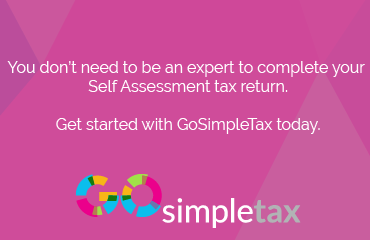What is a second payment on account and how is it calculated?
Article Author: Amanda Swales Posted on: June 10, 2019 (Full Author Bio in the box on the right side) 4026 views
4026 views

For the uninitiated, you may be wondering what a ‘second payment on account’ is. If you’re a freelancer or have any earnings outside of PAYE, you may need to make two advance payments on account towards your current year’s tax bill.
As most of you will be aware, the date of the first payment on account is 31st January – which is also the deadline for your Self Assessment. However, without the buzz of tax conversation, the summer deadline is considerably less observed and can catch out even the most diligent of taxpayers.
Not everyone will need to make payments on account, but with the 31st July deadline fast approaching, it’s best to be certain well before the due date. To clarify, Mike Parkes from GoSimpleTax has provided an overview of your responsibilities.
What is a second payment on account?
For those who are required to make payments on account, your estimated tax liability for the year ahead is split into two in order to make the payment easier to manage. For example, if your tax bill for 2017/18 was £5,000, then HMRC will require two payments on account of £2,500 each to go towards the 2018/19 tax year. The first will be due on the 31st January 2019, and the second on the 31st July 2019.
You will only be required to make payments on account if your Self Assessment bill was above £1,000. Although, if over 80% of your annual tax bill is deducted at source (from employment for example), you are also exempt from making payments on account. For instance, you may have a total tax bill of £10,000 for 2017/18, £8,200 of which is paid via your salary – so you just need to make one payment of £1,800 in January, and not any payments on account (as 82% of your tax is paid at source, through your salary).
How is it calculated?
It’s important to remember that payments on account are based on your earnings from the previous year. This means that should your income dramatically fall, your payments on account may be reduced to reflect a lower income. You can, therefore, make a claim to reduce your payments on account. Be careful though: reduce them too much and you can incur an interest charge on any tax shortfall.
While the opposite applies if your income increases (as this will result in a ‘balancing payment’ on 31st January of any shortfall from your two payments on account), it’s important to be aware of these hidden costs and be alert to the consequences of any significant changes to your earnings.
If you’re struggling to find the relevant information to make your second payment on account, check any HMRC correspondence you’ve received. They should have written to you following your January payment, including further details on how to pay in the summer.
What if I can’t afford it?
Contact HMRC well before the 31st July if you’re concerned you can’t make payment. They may be able to arrange a payment plan. Should you miss the deadline without informing them, you’ll start to accrue interest and penalties.
HMRC are particularly stern with on account payments. If you haven’t paid off the tax by the following January, you can be expected to pay 5% of the total charge along with the accrued interest. Ultimately, be sure to stay aware of your responsibility throughout the year to avoid any hidden costs and being charged further.
About GoSimpleTax
It’s not easy to stay well informed of legislative changes and your tax responsibility. That’s why software like GoSimpleTax offers tools to help keep you compliant. With this platform, you can keep track of tax bill payments and ensure that funds are available for both payments.
Latest Posts
-

Staying HMRC Compliant: VAT Returns Have Chan...
by Amanda Swales on January 29, 2020 Accounting & Tax -

Self Assessment Tax Return 101 - Filling In T...
by Amanda Swales on January 15, 2020 Accounting & Tax -

-



 Self Assessment Tax Return 101 - Filling In The Form Fast
Self Assessment Tax Return 101 - Filling In The Form Fast  How To Make The 2019-20 Tax Year The Time Of Tax Savings As A Sole Trader
How To Make The 2019-20 Tax Year The Time Of Tax Savings As A Sole Trader  HMRC Taskforces Targeting VAT Fraud
HMRC Taskforces Targeting VAT Fraud  IT Contractors - Profit extraction by dividend payment
IT Contractors - Profit extraction by dividend payment  PAYE Week 53 payments HMRC
PAYE Week 53 payments HMRC  A Guide To Tax Changes Impacting Landlords
A Guide To Tax Changes Impacting Landlords  Self Assessment Payments on Account
Self Assessment Payments on Account  The top 6 most common mistakes made on Self Assessment Tax Returns
The top 6 most common mistakes made on Self Assessment Tax Returns  Cloud Accountancy for Contractors: Do you find it mystifying?
Cloud Accountancy for Contractors: Do you find it mystifying?  Choosing the right VAT route
Choosing the right VAT route  Beginners guide to business tax deduction
Beginners guide to business tax deduction  Should an IT contractor become VAT registered
Should an IT contractor become VAT registered  Top Tax Tips for UK Contractors and Freelancers
Top Tax Tips for UK Contractors and Freelancers  3 Tips For Handling The Paper Tax Return Submission
3 Tips For Handling The Paper Tax Return Submission  5 reasons to update your self-assessment throughout the year
5 reasons to update your self-assessment throughout the year  Corporation Tax: Late Payment penalties and interest charges explained
Corporation Tax: Late Payment penalties and interest charges explained  Scotland Vs England And Wales: What Are The Differences In Tax?
Scotland Vs England And Wales: What Are The Differences In Tax?  The Tax Investigation Process
The Tax Investigation Process  Deadline day penalties: a subjective approach
Deadline day penalties: a subjective approach  Who Needs A UTR Number Anyway?
Who Needs A UTR Number Anyway?  Are you aware about the new HMRC Your 2016 Tax Report Phishing Scam?
Are you aware about the new HMRC Your 2016 Tax Report Phishing Scam?  Top 3 Reasons Why Freelancers and Contractors should hire an Accountant
Top 3 Reasons Why Freelancers and Contractors should hire an Accountant  Are You Declaring All Of Your Earnings To HMRC?
Are You Declaring All Of Your Earnings To HMRC?  Review bid gets crucial boost from influential and campaigning politician
Review bid gets crucial boost from influential and campaigning politician  Top Tax Changes That Contractors Need To Know
Top Tax Changes That Contractors Need To Know  Key tax dates coming up in July
Key tax dates coming up in July  Staying HMRC Compliant: VAT Returns Have Changed
Staying HMRC Compliant: VAT Returns Have Changed  Do I Need To Register As A Self-Employed Sole Trader?
Do I Need To Register As A Self-Employed Sole Trader?  How long to keep your PAYE records
How long to keep your PAYE records  What is a second payment on account and how is it calculated?
What is a second payment on account and how is it calculated? 

